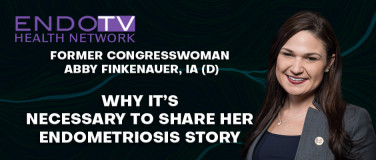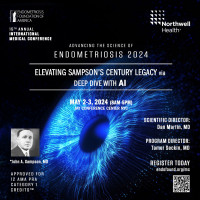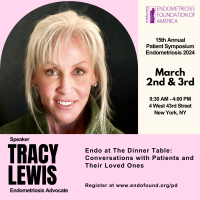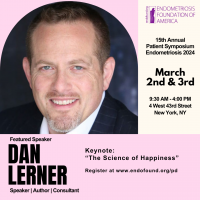
When Allyson Bontempo set out to understand how endometriosis patients engage in online communities, she had hoped to recruit a modest number of survey participants to answer questions that would illuminate the interplay between how their experiences within the healthcare system and with healthcare professionals shapes their use of these communities. Instead of the hundred or so participants she’d hoped to recruit, she was met with a flood of interest in the survey, with around 1,400 respondents in just a few months. Whereas Bontempo says it can sometimes be challenging to find and recruit patients for this kind of social science survey, the overwhelming number of responses made it clear to her that patient support networks are crucial in shaping the trajectories of individual experiences of endometriosis.
One response that emerged time and again, here and in subsequent surveys, was a feeling of dismissal or invalidation by healthcare providers. Some respondents say they were made to feel that their symptoms were “all in their head,” while others recount instances in which healthcare providers were not adequately informed about endometriosis, or in fact provided patients with misinformation about their own illness and its symptoms.
Bontempo hadn’t originally intended to study communication and patient care, or even endometriosis specifically. After completing a substantial amount of work toward a PhD in clinical psychology at Nova Southeastern University in Fort Lauderdale, Florida, a desire to prioritize her health led her to Rutgers University in New Jersey, where she had a network of community and family support. Here, she discovered the media and communications program, and fell in love with the field of patient-provider communication. She would go on to complete a master’s degree in communication and information studies, and from there to pursue a PhD in communication.
Now deep into her PhD candidacy, she has coordinated three additional studies that were borne of her initial investigations into online patient communities. Her work broadly explores three domains: diagnostic error, which is a persistent problem for endometriosis patients, the quality of interactions between patients and their providers, and the support networks patients find in online communities. One of her most recently published papers directly addresses the problem of misdiagnosis and diagnostic delay in endometriosis, and much of her ongoing and forthcoming work is focused on understanding how communication between patients and providers affects treatment outcomes, and where these relationships might be improved to strengthen patient trust.
In one survey that specifically addressed trust in health care providers, many respondents expressed frustration with a lack of medical knowledge of endometriosis and the breadth of its clinical manifestations, even among OBGYNs. This perceived knowledge gap is due in part to what many providers themselves describe as a very limited focus on endometriosis or reproductive health in general during their medical training, which can be especially dismaying and puzzling for many patients due to how common endometriosis is and how deeply it pervades the lives of those who struggle with it.
Beyond a lack of training, another major issue Bontempo has identified in her work is a hesitancy among providers to straightforwardly communicate uncertainty to patients. “If doctors don’t know what’s going on, instead of them saying they don’t know,” Bontempo says, “they can say, ‘oh, well, it’s normal or it’s anxiety,’ because maybe they don’t want to say ‘I don’t know’ or they’re not comfortable, and there’s a medical culture that historically encourages that.” But rather than uncertainty undermining trust in providers, overwhelmingly Bontempo found that the patients she surveyed would have preferred that their providers communicated this uncertainty. “Especially in terms of that honesty and that transparency,” she explains, “that would actually help heighten their sense of trust with their providers.”
The relationship between patient and provider has a profound impact on the quality of a patient’s life, and her work in clinical psychology informed Bontempo’s insights into how a patient’s self-esteem and the extent to which they feel their experiences are heard and understood are inseparable from the quality of their interactions with their healthcare providers. Since many endometriosis patients experience years-long delays in diagnosis or high rates of misdiagnosis, they commonly identify a sense of being dismissed, invalidated, or abandoned by providers, prior to and after a diagnosis is reached. Importantly, Bontempo notes, “they’re not just saying that their symptoms are dismissed, but they’re saying that they are dismissed.”
Bontempo’s work reveals a complex dynamic between the way a provider communicates with a patient and patient self-esteem, especially the extent to which patients personally identify with these invalidating interactions with providers. When she asked if invalidation might ultimately lead to depression, she found a clear relationship between patient outlook and provider attitudes. “Essentially this internalized or this personalized sense of invalidation leads to decreased self-esteem, and then that predicts greater depression scores.” Importantly, the extent to which these interactions contributed to depression depended on patient personalization of a provider’s assessment of their condition. For many endometriosis patients who might spend a decade or more in pain while seeing physicians who lead them to believe that this pain is either normal or stems from a psychiatric condition, even the relief of a diagnosis can be tinged with anger and frustration over years of energy dedicated to self-advocacy in the face of repeated dismissal.
The lack of medical and scientific understanding of the root causes of endometriosis is only a small part of the bigger picture of how to effectively manage this illness, as Bontempo’s extensive body of work has made clear. A small grant from the Endometriosis Research Center allowed Bontempo to delve more deeply into some of the ways that healthcare providers could be more supportive of endometriosis patients throughout the management of their illnesses. Overwhelmingly throughout her work, patients cited what was and wasn’t working for them in healthcare settings, but Bontempo was now able to zero in on the question of how supportive interactions could be encouraged based on some of the negative patterns patients had previously identified. “There’s dismissal, not listening, but more concretely,” Bontempo says, “thinking about some kind of communication skills training for healthcare providers, how to better interact with patients that is actually informed by what patients say, not just by what researchers think and what theory says.”
This is the center around which Bontempo’s current research efforts revolve: understanding provider uncertainty and finding ways to facilitate more open communication between patients and providers. An exciting area she has been exploring recently is the importance of language itself, and how the words and phrasing chosen by providers may seem subtle but can have a big impact on patient trust and outlook. Her faculty advisor, Dr. Lisa Mikesell, PhD, is not only a patient-provider expert, but brings a background in linguistics to this work as well. She hopes to record patient-provider interactions in real time and identify precisely how patients perceive the diagnostic language used by their providers. The feedback from these closely monitored interactions could then be integrated into the provider’s practice, informing them of how their use of specific language could either help or hinder a patient who is already bearing the personal burden of having to articulate the symptoms of an invisible illness.
The thread that binds all of Bontempo’s work is a passion for patient care and a strong desire to help those who have identified themselves in surveys as a “drowning population.” Her goal beyond completing her PhD is to remain engaged with her research in a way that will meaningfully impact patient’s lives, whether that’s within academia or in the clinic.
What has struck her, continually, is the need for endometriosis patients to be heard and to share their experiences with others who understand. This shared perspective is a key to renewed confidence among patients, especially those who have felt invalidated by their healthcare providers. This confidence can indeed empower endometriosis sufferers to advocate more strongly for themselves in the doctor’s office and even among their peers, steering the trajectories of their illnesses in more positive directions. The ability to give patients the tools to amplify their own voices and experiences has been a driving force throughout Bontempo’s career. “This work gives me purpose,” she says. “It drives me every day and it has given my life a lot of meaning, and I am grateful that I have found a way that I can continue to help people.”









